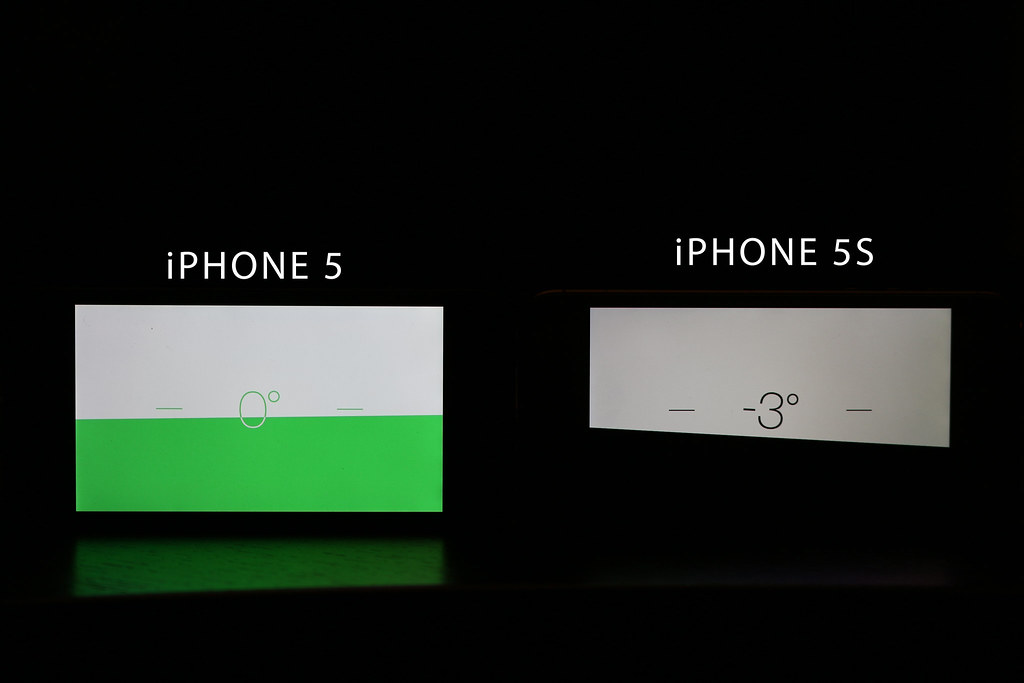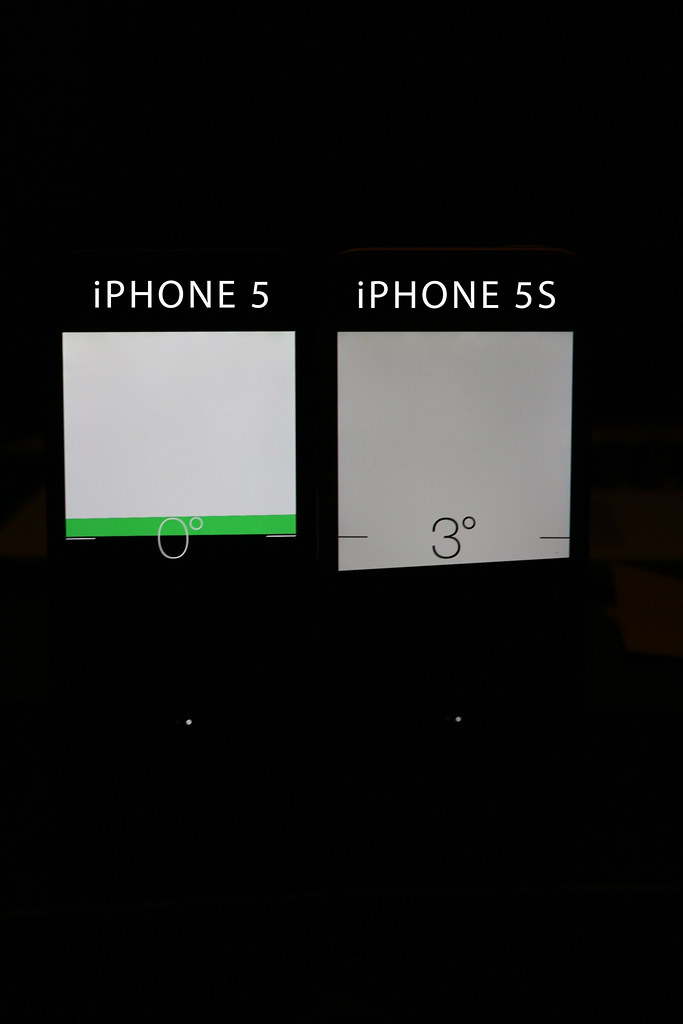
Since the iPhone 5S landed in the hands of new owners a few weeks ago, there have been reports that on-board sensors like the gyroscope, compass, and accelerometer haven't been working properly on some devices. We've confirmed the new iPhone's failings on our own. It's not just off. It's embarrassing.
We tested two iPhone 5S units running the latest version of iOS 7 against the iPhone 5, as well as against real-world measuring tools to find out if the new iPhone's sensors are off, and if they are, by how much. In most cases, we used the iPhone's built-in iOS 7 apps for measurements, working under the assumption that Apple would properly calibrate its hardware to work with the software of its own design. We were wrong.
Level

In the GIF and still image above, you see a pretty dramatic illustration of the difference between the iPhone 5S internal inclinometer readings and a real measurement of inclination. A simple Stanley spirit level tells the whole story: The iPhone 5S level readout in the iOS 7 compass software read 2-3 degrees off in our tests, while other users are reporting that the level is off by as many as 4-6 degrees. We performed the same test with an iPhone 5, and readout was almost perfect, indicating that hardware is at least partly the culprit. That also means a fix might not be as easy as
an OTA firmware update.

We also tested the level using the free iHandy Level app to similar results. In all cases, we were sure to keep the side of the iPhone flush to the level.
Two degrees might not seem like much, but it's actually a reasonably big deal. If you use this level to set up shelves (or tackle any other home improvement gig) you'd end up with a mess.
Gyroscope

As with the simple inclinometer measurements, the iPhone 5S gyroscope readings show a discrepancy between the iPhone 5 and iPhone 5S. This shouldn't be a surprise since it's the same piece of hardware as the inclinometer, just with an added third dimension. Above is what happened when I tossed both phones on a level table. The iPhone 5 reads level, while the iPhone 5S reads -3 degrees off level.

Why does this matter? Because a wonky gyroscope is going to totally screw up gaming. Check out the drift when I'm playing EA's Real Racing 3. The green light flashes, the car goes left. The phone is still and level.
Compass

The compass is a little more challenging to test, because the numbers on both the iPhone 5 and iPhone 5S tended to jump around bit. After getting the readings steady, though the two phones consistently measured 8-10 degrees apart. It's also worth noting that on the iPhone 5S, the compass application was prone to either freezing up or giving wonky readings that could only be fixed by killing and restarting the app.

When comparing the measurements against an actual compass, neither iPhone's compass points to the same magnetic north as the real tool; however, the iPhone 5 clearly has a more accurate measurement.
This compass shortfall won't have you confusing east from west when you get out of the subway. But for more detailed mapping and way-finding apps, a 10 degrees disparity could impact what an app thinks you're doing and which way you're going. You probably shouldn't be using an iPhone compass to navigate the woods or set your course at sea anyway—but, yeah, don't do that.
Accelerometer

We did a brief test on the new iPhone's accelerometer data, and preliminary results seem to indicate that the 5S is registering way more latent motion than the iPhone 5. The above images show the readouts from the accelerometers of both phones sitting flat on a level desk. Our testing isn't conclusive here, but it's worth noting because the discrepancy is in line with those seen in tests of the other sensors.
Again, you can expect this to screw up gaming as well as readings on motion-based exercise apps, an especially unfortunate byproduct given how heavily Apple hyped its activity-tracking M7 processor (more on the hardware implications below).
What's going on, and what's the fix?
The faulty measurements from the iPhone 5S could either be a hardware problem or a software problem, and if you read through the experiences of users in the extensive MacRumors thread on the topic, there's an argument to be made for both.
The problem seems to be incredibly widespread, but it also affects different phones in different ways. If it were consistent across the board—for example if the compass was 2-degrees off for everyone—then it would be easier to pin the blame on iOS 7. The solution to the current sensor woes, then, could be as simple as a firmware fix to make the calibration more accurate.
As richard371 in the MacRumors thread points out, though, the inconsistency of the problem suggests—and the fact that it doesn't show up on an iPhone 5 running iOS 7—that the hardware isn't being properly calibrated in the factory, and that means that there are millions of phones out there that might never be exactly right. That's a huge problem. (Some users have reportedly had luck taking their phones back and swapping them for others—but just as many users report making the exchange and getting another malfunctioning unit.)
If it's indeed an underlying hardware problem, Apple will probably quietly resolve the issue with a tweak on future production units of the 5S, which still leaves millions of potentially defective units in circulation. It's possible that Apple could push a calibration tool or software fix that accounts for the inconsistent hardware performance in existing handsets, but it's very unlikely that the company will take all of these phones back (or that enough people will notice/care enough to get a new one.
Either way, it's a problem, whether you're a gamer, a home-improver, or someone who just wants their phone to work as advertised out of the box.
Πηγή:http://gizmodo.com/t...d-up-1440286727
http://www.macrumors...ears-incorrect/





















